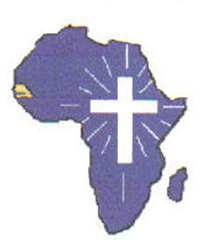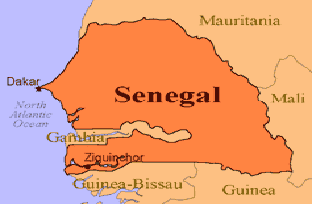
senegal

Statistics
Government: Parliamentary democracy, independent in 1960
Population: ~12.8 Million (2012)
Ethnic groups: over 50
Languages: 37
Official language: French
Full Bible: only 3 languages
Religions: There is freedom of religion. Islam: 90.8% Catholic : 4.4% Animist: 3.6% Evangelical Christian: less than 0.1%
History and Politics
Senegal is the westernmost country on the African continent, with an area of just under 200,000km2, similar in size to England and Scotland combined. Senegal is largely flat with a natural vegetation of dry savannah woodland.
Senegal and in particular, the Casamance region has had a bit of a chequered history. Senegal was one of the West African territories allocated to the French at the Berlin Conference of 1884-85, as a resolution to the preceding 'Scramble for Africa' by all the major European countries. As can be imagined, none of the representatives included African delegates, and everything was done purely to limit the greed of the colonial countries.
Senegal was considered by France, as a territory, part of the mother country, with its populace as subjects. In the 1950's, these West African territories began to press for independence. The leader of Senegal at the time favoured the idea of a strong federal union of all French territories in Africa. In the late 1950's he gained support from the leaders of present day Mali, Burkina Faso and Benin to form a single union, the Mali Federation. However, when General Charles De Gaulle, the French President, visited these territories, he gave them a stark choice: either complete independence from France or limited self government with a union still run by France. This frightened some of the delegates but not Senegal or Mali who continued to demand independence as a union rather than single countries. De Gaulle switched tack, and on 20 June 1960 Senegal and Mali became completely independent whilst remaining in the French union. Mali and Senegal split subsequently and since then Senegal has been a separate state apart from a brief and ill-fated union with Gambia for two years in the 1980's.
Senegal is a republic, with the president and 120 members of the national assembly elected every 5 years by universal adult voting. The political system is a multiparty democracy. Macky Sall won presidential elections in March 2012, replacing President Abdoulaye Wade, who controversially ran for a third term in office. A former close associate of his predecessor, Mr Sall broke away in 2008 to form his own opposition party. He challenged Mr Wade for the presidency in March 2012, beating him in the second round after winning the support of other opposition parties. This is the third time since 2000 that a general election has been followed by a peaceful transfer of power - virtually unique in Africa.
An understanding of Senegal's Marabouts and the power of the Islamic brotherhoods (confriéries) is essential in understanding Senegal. Whereas orthodox Islam holds that every believer is directly in touch with Allah, the traditionally hierarchical societies of West Africa find it easier to have religious leaders ascribed with divine power, providing a link between God and the common populace. These are known as Marabouts and are held by the disciples (talibés) as saints. The concept of brotherhoods - groups who follow the teachings of a particular Marabout - was imported from Morocco. The alliance between the brotherhoods and the government continues to be a major feature. The Parti Socialiste (PS) relied on Marabout backing for at least 40 years. To keep the brotherhoods sweet, the government publicly reinforced the Marabouts' power and, behind the scenes, allowed them a completely free hand in the ground nut harvest.
Adapted with permission from the Lonely Planet guidebook The Gambia and Senegal, 2nd Edition ©2002 Lonely Planet Publications; additions from BBC News Senegal Profile website.The Casamance
The Casamance is the region of Senegal south of The Gambia; Ziguinchor is its main town.
The people of the Casamance have a long history of resisting the rule of outsiders. They have rejected slavery (both European and African), refused to accept France's colonial administration and have warred against the central government seeking secession.
A conflict that plagued the region for the 22 years originated from a pro-independence demonstration held in Ziguinchor in 1982, after which, the leaders of the Mouvement des Forces Démocratique de la Casamance (MRDC) were arrested and jailed. Over the next few years, the army clamped down with increasing severity, but this only galvanised the local people's anti-Dakar feelings and spurred the movement into taking more action. The MRDC's campaign of violence led to the killing of some 3,500 people. Its fighters were spread across the borders of The Gambia to the north and Guinea-Bissau in the south. The conflict came to an end in December 2004, when the government signed a peace deal with the rebels. Since then, the Casamance has been relatively safe with only isolated, sporadic outbursts of rebel activity. As a result, the Casamance is showing signs of increased investment and prosperity, notably the establishment of a university in Ziguinchor.
Religion in Senegal
Nominally, Senegal is predominantly (over 90%) Muslim. Despite the large majority, however, there are relatively few practising Muslims and, where Islam is practised it tends to be mixed with traditional (animist) beliefs. You will, however, hear the call to prayer from the mosques in Ziguinchor, several times a day, starting at dawn!
Animism
Animism is the belief that spirits inhabit objects and govern their existence. Certain objects, inhabited by spirits, are therefore considered sacred. An important characteristic of animism is the use of 'fetishes' - sacred objects or charms, sometimes known as "gri-gri" which are used to ward off evil or bring good luck. For example, some fishermen believe that a correctly placed "gri-gri" will protect them from disaster and ensure a good catch. "Gri-gri" are often worn, and may contain a verse from the Quran [Koran]. Christianity
The good news for Christians is that, at the moment, there is freedom of religion in Senegal and widespread religious tolerance, although this beginning to change in the North. The feeling is that we need to make the most of this situation since, if a more hardline government is ever elected, this could all change.